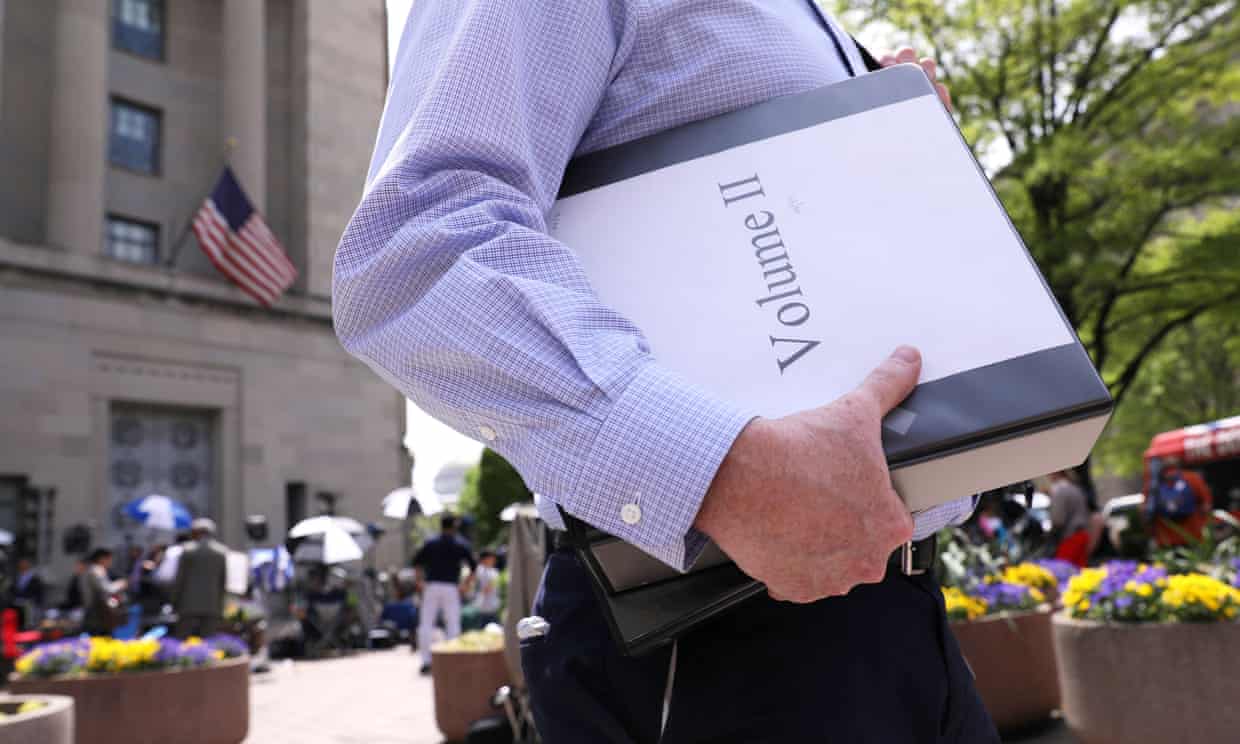
Special counsel says evidence obtained about the president threw up ‘difficult issues’

Robert Mueller’s much-awaited report details “multiple contacts” between the Trump campaign and Russian government officials, and sets out 10 “episodes” in which Donald Trump possibly obstructed justice.
Mueller says he did not make a “traditional prosecutorial judgement” on whether Trump did obstruct justice and adds that the evidence obtained about “the president’s actions and intent” threw up “difficult issues”.
However, the special counsel refused to exonerate Trump on the charge. “If we had confidence after a thorough investigation of the facts that the President clearly did not commit obstruction of justice, we would so state,” Mueller wrote in his conclusion.
He added: “Based on the facts and the applicable legal standards, we are unable to reach that judgement.”
Mueller’s 448-page report also reveals that Trump believed he was “fucked” and his presidency was over when Mueller was first appointed. The special counsel began his investigation into possible collusion in May 2017, soon after Trump unceremoniously fired FBI chief James Comey.
The report is divided into two distinct parts – the first concerning Russia’s efforts to help Trump win the 2016 US presidential election, and the second on whether Trump obstructed justice once installed in the White House.
The report concludes there was not an “active” criminal-level conspiracy between the Trump election team and Moscow. But the document contradicts claims of total exoneration made by Trump and his hand-picked attorney general William Barr, and provides fascinating new details.
Russian contacts
Mueller says that the Kremlin interfered in the US election in “sweeping and systematic fashion”. This interference – some of it detailed in previous indictments – included a social media operation run out of Russia and the hacking of Democratic National Committee emails by Russian military intelligence from Moscow.
These emails were given to WikiLeaks, which released them in July and October and November 2016. “The investigation ... identified numerous links between the Russian government and the Trump Campaign,” Mueller writes.
In March, Barr released a quote from the report suggesting that Mueller had unambiguously cleared Trump and his associates of any collusion. We now know that Barr was quoting selectively and left out a crucial sub-clause which says that Trump’s campaign expected to profit from Russian hacking.
The full paragraph says:
“Although the investigation established that the Russian government perceived it would benefit from the a Trump presidency and worked to secure that outcome, and that the Campaign expected it would benefit electorally from information stolen and released through Russian efforts, the investigation did not establish that members of the Trump campaign conspired or coordinated with the Russian government in its election interference activities.”
Mueller is careful to explain how he reached his conclusions. He points out that “collusion” is not a term in US federal law. He defines conspiracy as “an agreement – tacit or express” between Russians and the Trump team, and stresses its active component.
The report makes clear that the Trump campaign “showed interest” in Democratic party emails hacked by Moscow and welcomed their potential to damage Hillary Clinton, Trump’s opponent.
It lists “numerous links” between campaign officials and “individuals with ties to Russia”. These include business connections, offers of assistance, invitations for campaign officials to meet with Russian representatives, and “policy positions” setting out how to improve US-Russian ties.
Most of these interactions are already known. The report gives compelling new texture. It says that numerous individuals connected to Trump – his campaign manager Paul Manafort, and national security adviser Michael Flynn, among others – lied about these encounters. They used encrypted communications which the special counsel says he wasn’t always able to recover.
The GRU, Russian military intelligence, used WikiLeaks to disseminate its filched material. The report says Julian Assange was opposed to Clinton and described her in 2015 as a “bright, well-connected, sadistic sociopath”. It says the GRU delivered stolen emails to Assange who was living at the Ecuadorian embassy in London. They arrived via an encrypted attachment.
Passages concerning Trump’s friend and ally Roger Stone and WikiLeaks are redacted, ahead of Stone’s felony trial in November. Nevertheless, the report says that Trump’s team including Manafort, Donald Trump Jr and others were “excited” by the email dumps and planned a “communications campaign” around them.
It suggests Trump was personally involved in these decisions: “[REDACTED] discussed with campaign officials that WikiLeaks would release the hacked material. Some witnesses said that Trump himself discussed the upcoming releases.”
The US political commentator Jerome Corsi tried to get in touch with Assange and asked Ted Malloch – a Trump supporter based in London – if he could help. Corsi suggested that “individuals in the orbit of the UK politician Nigel Farage might be able to contact Assange”, the report says.
Mueller also details an elaborate operation by associates of Flynn to locate Clinton’s “missing” 30,000 emails. Barbara Ledeen, a long-time US Senate staffer, briefed Flynn about her efforts throughout the summer of 2016. She collaborated with Peter Smith, a Republican party activist who killed himself in 2017.
“Trump asked individuals affiliated with his campaign to find the deleted Clinton emails,” the report says.
Some of the most striking new facts concern Manafort’s meetings with Konstantin Kilimnik. Kilimnik is a Russian national who worked with Manafort for more than a decade in Ukraine and who – according to the FBI – has ties to Russian intelligence. The pair met twice during the campaign, with Manafort passing Kilmink “internal polling data”.
Kilimnik has denied being a spy. The report reveals that Kilimnik travelled to the US in 1997 on a Russian diplomatic passport. It says he “maintains a relationship” with Viktor Boyarkin, who served in office of the Russian defence attache in Washington. Boyarkin worked as deputy to the Russian oligarch Oleg Deripaska.
Meanwhile, after Manafort and his deputy Rick Gates were indicted by a grand jury on multiple felony counts Manafort told Gates he had spoken to Trump’s personal counsel, and said: “We’ll be taken care of.”
The word “pardon” is not explicitly mentioned, but Mueller writes that Manafort told Gates he “had talked to the president’s personal counsel and they were ‘going to take care of us’”.
Obstruction of justice
The Mueller report says that in June 2017, Trump told his White House counsel to call acting attorney general Rod Rosenstein and order him to fire Mueller. Trump declared: “Mueller has to go.”
Don McGahn, the counsel, refused, deciding he would rather resign than trigger what he regarded as a potential “Saturday Night Massacre” – a reference to Richard Nixon’s 1973 attempts to fire the special prosecutor investigating the Watergate scandal.
Trump twice told McGahn to order Rosenstein to fire Mueller, the report says. McGahn, who left the White House in October 2018, recalled the president telling him: “Call Rod, tell Rod that Mueller has conflicts and can’t be special counsel.” McGahn also recalled Trump telling him: “Mueller has to go” and: “Call me back when you do it.”
McGahn appears to have behaved honourably under trying conditions, the report suggests. Trump told him to deny a report by the New York Times that said the president had wanted to fire the special counsel; McGahn refused.
“Each time he was approached, McGahn responded that he would not refute the press accounts because they were accurate,” the report says.
The incident was one of 10 examples where Mueller considered that Trump had possibly obstructed justice.
Other instances include Trump’s instruction to Comey to “lift the cloud” over his presidency – the cloud being Russia – and his subsequent firing of Comey for failing to make the cloud go away.
Also referenced are the president’s efforts to curtail Mueller’s investigation and to force Sessions – his unloved attorney general – to reverse his decision to recuse himself from the Russia investigation.
The report mentions Trump’s attempts to cover up the notorious Trump Tower meeting in June 2016 between Manafort, Don Jr, his son-in-law Jared Kushner and a Russian lawyer promising “dirt” on Clinton. It also cites his behaviour towards Michael Flynn and Michael Cohen – national security adviser and personal lawyer respectively – after they began cooperating with investigators.
Mueller gives a nuanced explanation for why he ultimately decided not to subpoena Trump, who refused to sit for a face-to-face interview and instead provided written answers to the special counsel’s questions. Mueller called these answers “inadequate”. Compelling Trump to appear in person would have meant “substantial delay”.
Yesterday’s report reveals for the first time the president’s answers to the questions the special counsel posed him, reproduced as an appendix.
As a clearly exasperated Mueller notes, “the president stated on more than 30 occasions that he ‘does not recall’ or ‘remember’ or ‘have an independent recollection’” of information called for by the questions”.
The first three responses the president gives relating to the Trump Tower meeting gives a flavour of his spectacular memory failure.
They begin:
– “I have no recollection…”
– “Nor do I recall…”
– “I have no independent recollection…”
After he received these replies, Mueller went back to Trump and asked again for a face-to-face interview, given the “inadequacy of the written format”. Trump again declined.
Despite this, Mueller writes that he was able to gather “sufficient evidence to understand relevant events and to make certain assessments without the President’s testimony”.
Another factor weighing on Mueller’s decision not to reach a conclusion on obstruction, the report says, is that a sitting president cannot be charged with a crime, under current US Department of Justice guidelines. The president is also invested with more powers by virtue of his office than other government employees, it says.

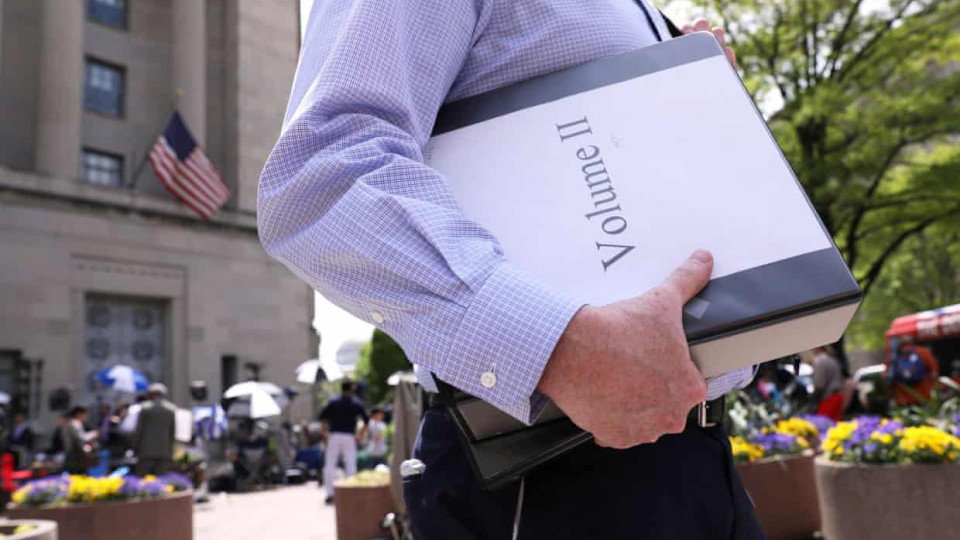
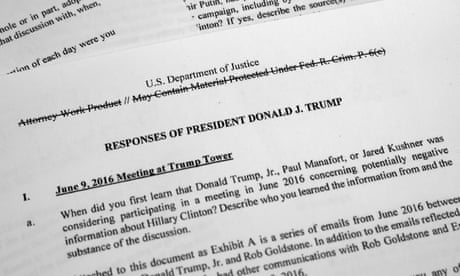
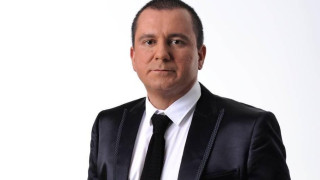
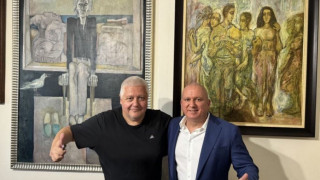


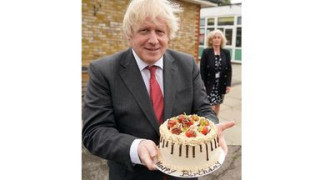


Leave a comment